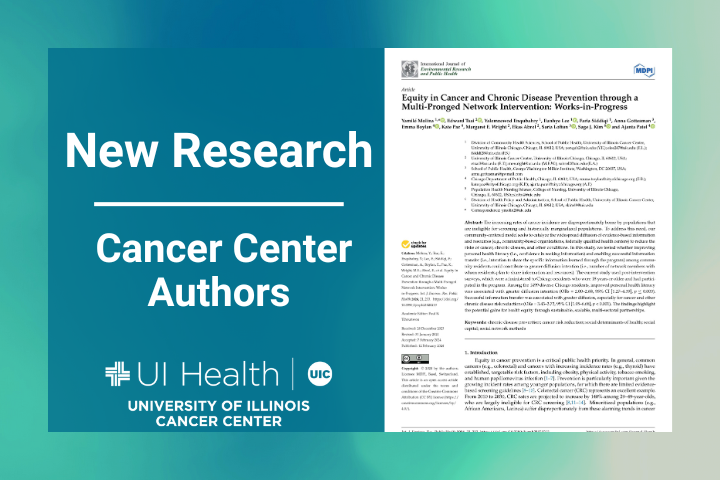
The potential exists for health equity gains in cancer and chronic disease prevention through sustainable, scalable and multi-pronged partnerships across government, community/nonprofit, FQHC and academic sectors, according to a proof-of-concept study by University of Illinois Cancer Center authors and others published in the International Journal of Environmental Research and Public Health.
The Cancer Center plans to build on the findings to focus interventions specifically on colorectal cancer, said Cancer Center Associate Director for Community Outreach and Engagement Yamile Molina, PhD, the study’s first and corresponding author, as well as a UIC School of Public Health Associate Professor.
In Illinois, colorectal cancer is the fourth leading cause of cancer deaths in the state, with rates of new cases and deaths highest in Black populations, according to the Illinois Department of Public Health’s 2022-2027 Illinois Comprehensive Cancer Control Plan.
The current study focused on improving health literacy and used post-intervention surveys from participants in the Community Health Response Corps (CHRC) Program, established in 2022 by the Chicago Department of Public Health to increase health equity in underserved communities on Chicago’s South and West Sides, where residents are predominantly Black and Hispanic. The program uses Community Health Workers to connect residents to hyperlocal social and health resources and information.
Researchers tested whether improving personal health literacy and enabling community residents to share resources and information learned in the program would contribute to more widespread dissemination of the information and resources.
Among nearly 1,500 diverse Chicago residents, improved personal health literacy was associated with greater intention to share the information. Successful sharing of information was associated with greater dissemination, especially for cancer and other chronic disease risk reductions.
Partnerships Are Key
“Our findings suggest that optimizing personal health literacy skills and quality information transfer may transform residents from recipients to active resources in marginalized communities,” the study concludes.
Among the authors, the others affiliated with the Cancer Center are and Sage Kim, PhD, co-lead of the Cancer Center Cancer Prevention and Control (CPC) Research Program; Senior Research Scientist Margaret Wright, PhD; Research Scientist Edward Tsai, MPH, PhD; CPC member Saria Lofton, RN, PhD; and Research Specialist Ekas Abrol, MS.
